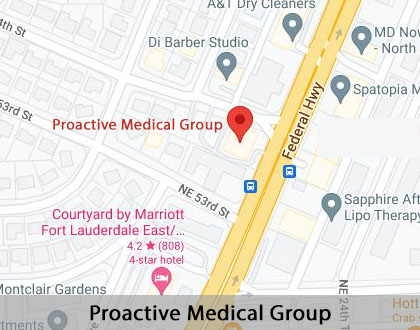Primary Care Fort Lauderdale, FL
Primary care is a patient-centered practice that includes diagnosing, preventing, and treating the body. Every patient should have a quality primary care physician in their life. By acting as a patient's first point of contact with the healthcare system, primary care physicians can help ensure a patient's overall well-being.
Primary care services are available at Proactive Medical Group in Fort Lauderdale and the surrounding area. We can help with a variety of healthcare needs, no matter how big or small. Call us today at (954) 938-2843 to schedule an appointment or learn more about our services.
Understanding Primary Care
The American Academy of Family Physicians states that primary care is the type of care given by physicians specifically trained in comprehensive first contact and continuing care. Unlike other specialists, primary care physicians and clientele are not limited to specific medical needs. Instead, primary care physicians focus on patients with undiagnosed signs or symptoms. Primary care is also not limited to any one origin of health concern - whether behavioral, biological, or social.
Primary care focuses mainly on promoting health, preventing disease, and maintaining overall wellness. It also involves diagnosing and treating acute and chronic illnesses, counseling, and patient education. These aspects may occur in a wide variety of healthcare settings, including in-patient, long-term care, critical care, and more. Most patients have only one primary care physician who collaborates with any other professionals on their healthcare team as needed and when appropriate.
“…primary care is the type of care given by physicians specifically trained in comprehensive first contact and continuing care.”
Who Primary Care Physicians Are
As mentioned earlier, primary care practitioners are a patient's first point of contact with the healthcare system. Consequently, they are also the focal point for any necessary, comprehensive care. Most primary care practitioners specialize in family medicine, internal medicine, or pediatric medicine. However, it is also possible to receive primary care from a non-primary care practitioner. These physicians typically focus on acute care, chronic care, rehabilitation, disease prevention, and health maintenance.
Still, these physicians do not offer their services within a broader context of first-contact, continuing, and comprehensive care. As such, they must work with primary care practitioners to ensure patient health. Fully-trained primary care doctors must complete residencies or fellowship training working with patients in acute and chronic care settings. They can also refer patients to specialists if they are dealing with conditions beyond the doctor's scope.
“…primary care practitioners are a patient’s first point of contact with the healthcare system.”
When Primary Care Is Necessary
Everyone needs some form of medical care eventually - whether it be due to acute illness, chronic illness, or injury. Those with chronic illness need professional guidance concerning an official diagnosis and treatment. Our primary care physicians can help patients dealing with various health conditions, such as allergic reactions, colds, coughs, dehydration, infections, nausea, muscle strains, and more. They can also help manage chronic conditions, including diabetes and obesity.
By sticking with one primary care physician, individuals can improve their overall healthcare access and patient experience. Having one primary care physician also allows patients to build a candid, genuine rapport about their treatment needs and desires while ensuring that the doctor has a full and detailed understanding of their medical history. In any case, each primary care doctor is specially trained to handle multiple treatments, medications, and medication interactions.
“Our primary care physicians can help patients dealing with various health conditions, such as allergic reactions, colds, coughs, dehydration, infections, nausea, muscle strains, and more.”
Check out what others are saying about our primary care physician services on Yelp: Primary Care in Fort Lauderdale, FL
Finding a Primary Care Physician
Many people begin their search for a primary care physician by asking someone they trust, such as a friend or family member, for a recommendation. However, it is crucial to remember that each patient is different with unique needs and preferences. As such, those with specific health concerns should look for doctors experienced in treating patients with similar conditions. It is also essential to consider location, as patients will visit their primary care physician for all of their everyday healthcare needs. Patients may be discouraged from making all necessary visits if they choose a doctor that is too far away.
Cost is also a factor. All patients should check that their chosen primary care physician is covered under their health insurance policy, as most plans will charge more for doctors out-of-network (if they choose to cover them at all). It is also recommended that patients check that their doctor is board-certified through the Certification Matters site. They can then rest assured knowing that their doctor has met the state licensing requirements and has passed comprehensive internal medicine exams.
“…those with specific health concerns should look for doctors experienced in treating patients with similar conditions.”
Questions Answered on This Page
Q. Who are primary care physicians?
Q. When is primary care necessary?
Q. How can I find the right primary care physician?
People Also Ask
Q. What are some of the most common conditions treated by a primary care provider?
Q. When should people see a primary care doctor?
Q. What types of treatment does a primary care doctor offer for injuries?
Follow Up Visits
Primary care often consists of follow-up visits, depending on the type of treatment a patient undergoes. Follow-up visits intend to evaluate patient progress for a particular treatment or ongoing condition. We will schedule a follow-up visit one to two weeks following the patient's initial appointment and will discuss the reason and importance behind it beforehand.
Follow up visits may be required for patients taking a new medication, those with a newly-developed acute or chronic condition, and those who have recently experienced an injury or major illness. During the follow-up visit, we will conduct all of our routine checks, ask the patient questions regarding their at home care, and make any alterations or recommendations necessary. We can also address concerns the patient has.
“Follow-up visits intend to evaluate patient progress for a particular treatment or ongoing condition.”
Frequently Asked Questions
Q. How often do I need to see my primary care physician?
A. You should see your primary care physician at least once a year for an annual checkup. Some patients may need to go in more often than others, depending on their healthcare needs. Ask your doctor to learn more.
Q. I rarely get sick. Do I still need a primary care physician?
A. Yes. A primary care physician can help maintain good health and prevent future illnesses. They can also identify any asymptomatic or dormant diseases. Often, primary care clinics also offer immunizations, imaging, and more. In the long run, taking preventive measures tends to lower your overall health costs.
Q. What is the difference between a doctor providing family medicine, internal medicine, and pediatric medicine?
A. All three are types of primary care doctors. However, each specializes in treating a different population. Internal medicine doctors treat adults, while pediatric medicine doctors (also known as pediatricians) treat children. Family medicine doctors treat patients of all ages.
Q. What should I talk to my primary care physician about?
A. You should tell your primary care doctor about any concerns or changes regarding your health, including anxiety and depression. We also have psychologists at our clinics for mental health treatment. Our primary care physicians can also help with healthy decision-making and lifestyle choices.
Q. What role do physician assistants and nurse practitioners play in primary care?
A. Physician assistants (PAs) can diagnose patients, practice medicine, and prescribe treatments under the supervision of a physician, surgeon, or other healthcare workers. Nurse practitioners (NPs) are advanced practice registered nurses. Their advanced clinical training enables them to diagnose and treat patients, execute complex procedures, and prescribe medications without supervision.
Start Feeling Better – Visit Us Today
By visiting us as soon as possible, our team can help get you the professional treatment you need. Instead of waiting around and allowing the symptoms to get worse, we can provide you with treatment options.
Definition of Medical Terminology
Call Us Today
When it comes to your health, choosing the right primary care physician can make all the difference. We at Proactive Medical Group can help. Call us today at 954-938-2843 to schedule an appointment or learn more about our services.
Helpful Related Links
- American Diabetes Association. American Diabetes Association. 2023
- American Heart Association. American Heart Association. 2023
- American Journal of Medicine. American Journal of Medicine. 2023
- American Lung Association (ALA). American Lung Association (ALA). 2023
- American Medical Association (AMA). American Medical Association (AMA). 2023
- American Migraine Foundation. American Migraine Foundation. 2023
- Asthma and Allergy Foundation of America. Asthma and Allergy Foundation of America. 2023
- CDC Respiratory Health Resources. CDC Respiratory Health Resources. 2023
- HealthCare.gov. HealthCare.gov. 2023
- Health and Human Services Reproductive Health Services and Resources. Health and Human Services Reproductive Health Services and Resources. 2023
- CDC Overweight & Obesity. CDC Overweight & Obesity. 2023
About our business and website security
- Proactive Medical Group was established in 2022.
- We accept the following payment methods: American Express, Cash, Check, Discover, MasterCard, and Visa
- We serve patients from the following counties: Broward County
- We serve patients from the following cities: Fort Lauderdale, Oakland Park, Wilton Manors, Pompano Beach, and Sea Ranch Lakes
- Norton Safe Web. View Details
- Trend Micro Site Safety Center. View Details
Back to top of Primary Care










